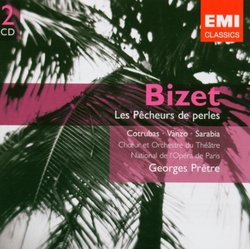| All Artists: Georges Bizet, Georges Prêtre, Paris National Opera Orchestra, Alain Vanzo, Guillermo Sarabia, Ileana Cotrubas, Roger Soyer Title: Bizet: Les PÍcheurs de perles Members Wishing: 0 Total Copies: 0 Label: EMI Classics Release Date: 8/10/2004 Album Type: Original recording remastered Genre: Classical Styles: Opera & Classical Vocal, Symphonies Number of Discs: 2 SwapaCD Credits: 2 UPC: 724358576429 |
Search - Georges Bizet, Georges Prêtre, Paris National Opera Orchestra :: Bizet: Les PÍcheurs de perles
 | Georges Bizet, Georges Prêtre, Paris National Opera Orchestra Bizet: Les PÍcheurs de perles Genre: Classical
|
Larger Image |
CD Details |
CD ReviewsCotrubas and Vanzo are good in the dreary 1863 version L. E. Cantrell | Vancouver, British Columbia Canada | 08/09/2005 (3 out of 5 stars) ".
Source: Analog studio recording from 1978. Sound: Acceptably good stereo for the soloists, but the chorus is sometimes rather distant. Text: Based on the 1975 critical text which purports to restore the original version of 1863, as written by Bizet. Documentation: No libretto. Brief essay by James Harding on the life of Bizet and the origin of this opera which, in passing, provides the least useful summary of the plot that I have ever seen. Track list identifies characters singing and provides timings. Reproduction of a mezzotint (I think) of the youthful Bizet looking insufferably pompous. Cast: Nadir - Alain Vanzo; Zurga - Guillermo Sarabia; Leila - Ileana Cotrubas; Nourabad - Roger Soyer. Conductor: Georges Pretre. In 1863, the 25 year-old Bizet composed a piece of oriental exoticism under the name, "Les Pecheurs de perles." (He wrote most of it under the impression that the opera was to be set in pre-Columbian Mexico but, hey, exotic is exotic, right?) The opera achieved a pallid success with eighteen performances and then was dead in France for the remainder of the composer's life, although it managed to hang on--barely--in other countries. In 1893, well after Bizet's death, practical people of the theater put together a performing version which struck the paydirt that Bizet had missed, so that "The Pearlfishers" is now a member of the standard operatic repertory to a degree that certainly exceeds "Werther," "Louise," "Mignon," "Hamlet" and probably even "Manon." The 1893 version was until 1975 the only performed version and the one to which most people are still accustomed. This is because of the many changes, one of the biggest and definitely the most obvious involved the best known number in the show, the big tenor-baritone duet, "Au fond du temple saint." In fact the concert version of the duet, with its almost classical symmetry, is from 1893. To hear the asymmetric 1863 version for the first time is a shock, a quite unpleasant one, like taking an additional and unnecessary step at the end of a stairway. I am always dubious about reconstructions of so-called original texts. They are usually the work of academics who are almost by definition not true men--or women!--of the theater. Academics have been responsible for such strange beasts as the reborn Prague version of "Don Giovanni" in which "Dalla sua pace" is relegated to a footnote, to revivals of the original version of "Tannhaeuser," to a recording of the pre-Boito version of "Simon Boccanegra." The main reason to acquire this performance is Ileana Cotrubas. She sings very well. Cotrubas brings more sheer voice to the part of Leila than Pierette Alarie in the 1953 recording, although she does not match the vocal agility of her fine French Canadian predecessor. Cotrubas sounds younger than Jeanine Micheau, who made an admirable recording in 1959 and again in 1960. Of the three, I think Cortubas was the most effective in communicating the distress felt by the emotionally torn priestess. Nadir is a role that has always attracted tenors who specialized in elegance: Leopold Simoneau, Nicolai Gedda, Alfredo Krauss. The excellent and scandalously under-recorded Alain Vanzo was among their number. He had recorded the part nineteen years before. In comparing the two recordings, it is remarkable to find how few changes almost two decades had wrought. In 1978, Vanzo was just a shade less vocally brilliant, but also just a shade stronger. His dramatic commitment, I think, had also increased to a small degree. As Zurga, hardy warrior, noble king, betrayed friend, frustrated lover and firebug, the fuzzy-voiced Guillermo Sarabia is a complete waste of time. Nourabad is a thankless role whose function is to keep the plot, such as it is, moving. All that I could recall of Roger Soyer in the part five seconds after he finished singing is that he was neither memorably bad nor good. Georges Pretre's conducting is four-square, moderately propulsive and largely indifferent. Three stars." |

 Track Listings (19) - Disc #1
Track Listings (19) - Disc #1